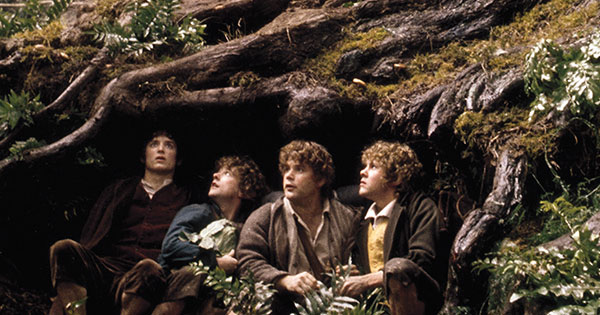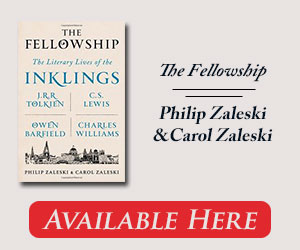
The Fellowship: The Literary Lives of the Inklings: J. R. R. Tolkien, C. S. Lewis, Owen Barfield, Charles Williams, by Philip Zaleski and Carol Zaleski, Farrar, Straus and Giroux, 656 pp., $35
This gigantic work of scholarship, insight and interpretation at first brought out the worst in me. Years ago, an American lady told me her son was serving as an ensign in the U.S. Navy, which in those days I considered the most magnificent instrument of secular benevolence ever created. Was he a regular officer, I asked her? “Oh, dear me no,” she haughtily, almost affrontedly replied. “He is a young New York intellectual.”
The Fellowship is all about intellectuals, and I am instinctively not on their side in life’s eternal struggle. The core of the book is a joint biography of four Oxford scholars who became the core of an informal discussion club in the 1930s. They habitually met in an Oxford pub, the Eagle and Child (“Bird and Baby” in their private lingo), and called themselves the Inklings (ugh! ). Two of them, J. R. R. Tolkien and C. S. Lewis, were to become world famous; Owen Barfield and Charles Williams, though unknown to general readers like me, were no less formidable of mind and thought. Between them this quartet, the book tells us at battleship length, had an extraordinary effect upon the literary cultures of England and the English-speaking world.
The most obvious element of it has been the influence of the group’s leader, Tolkien, and his seminal book of fantasy, The Lord of the Rings. This lies at the root of my own philistine attitudes in the matter, so profoundly do I detest the infantilism that seems to me to infect that vastly successful work, and that has tainted so much of English literature ever since—the faëry-tale aspect of it all (note the umlaut), the prevalent whimsy, words like dwimmer-crafty and Elfinesse and Elvendom, beings called Hobbits and Orcs, goblins and pixies and all that. Tolkien was, of course, by no means the first classical English writer to exploit fantasy—think of Jonathan Swift or Edmund Spenser, think of Lewis Carroll—but he was perhaps the first to do it as a genre in itself, beyond satire or allegory, and he has inspired a host of followers, from the philosophical to the science fictional.
So it has always seemed to me, anyway, but the Zaleskis, the distinguished husband-and-wife authors of this volume, have made me think again, and in particular to wonder how much of generic Tolkienism has a religious motive—not just the frankly sacred fantasy writings of C. S. Lewis, some of the most influential of the 20th century, but even The Lord of the Rings itself, elves and all. The Zaleskis are religious scholars, and their analyses of all four writers and their works are profoundly fair and earnest, but The Lord of the Rings emerges from their own 650 pages as the preeminent influence of the Inklings. Lewis, himself no laggard in the faëry field, wrote that nothing quite like it had ever been done before.
What did it mean? Three volumes long, with 475,000 words, it challenged readers and critics alike with its immensely detailed chronicle of an adventure-quest in a purely imaginary country called Middle-earth, inhabited by purely imaginary peoples, good and bad, called Hobbits or Orcs, including individuals with names like Frodo or Tom Bombadil, and a presiding magic in the form of a supernatural ring. The whole was couched in a pseudo-archaic idiom meticulously devised by Tolkien, but owing much to Nordic, Germanic, and Celtic mythologies.
Was it symbolism? Was it parable? Was it subcreationism? Was it plain storytelling? Some people, like me, were immediately antagonized by its whimsy: one fastidious friend of mine was almost defeated by a single Tolkienesque word in the very first paragraph of the first volume of the entire work, which spoke of somebody celebrating his “eleventy-first” birthday.
My friend went on nevertheless to read all three volumes during the following weekend and became a lifelong Tolkienite. He was a devout Roman Catholic, you see, as was Tolkien, and the Zaleskis have convinced me that The Lord of the Rings is full of inspiring messages to those who see in it specifically Christian allusions: to the Eucharist, for instance, to redemption, grace, hope, and the glory of holy virginity. The Zaleskis call it “the veiled place of Catholicism” in the work. Even I, agnostic that I am, recognize amid the faëry-ness grand moral themes concerning good and evil, fair play, materialism, mechanization, the evils of war, and kindness—but I see them all as mere incidentals to the fantasy.
So, as it happens, did all too many of the critics, when the work was published in 1954. Few indeed, outside the Inklings anyway, commented upon its Christian meanings. In America, Edmund Wilson called the whole thing balderdash. In England, Philip Toynbee thought it dull, poorly written, and childish, consigning the whole enterprise to oblivion. But there, of course, he was wildly wrong. Tolkienism has triumphed from his day into our own, extending its influence into almost every branch of literature, from science fiction to children’s books and to even loftier spheres of creative writing.
Most of us probably share Tolkien’s truisms about the decline of simplicity in our daily lives and the menaces of technology. Alas, though, it is the whimsy that has thrived, not the morality, and in the end, it seems, Tolkien himself cared more about his faëry-telling than his moralizing. The Zaleskis tell us that he went “almost balmy” in his obsession with his invented world of Middle-earth, angrily objecting, for instance, when a proposed cartoon version of The Lord of the Rings “put beaks and feathers on Orcs! ” If it was a noble Christian message that he hoped to leave to the world, he has failed. Peter Jackson’s movies of the book won Academy Awards, but viewers were merely warned that they contained intense battle violence and horror scenes, suitable only for persons 12 years and over.
As for myself, I have never been reconciled to generic Tolkienism and its effect upon our literatures, but when in his old age I met its eponym, I thought him entirely delightful, and not intellectuallish at all.


